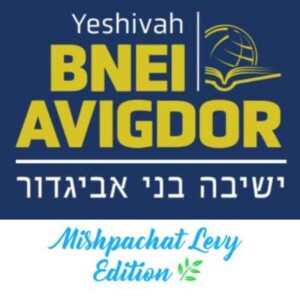

Today’s learning is sponsored
Sponsor a day's learning (thousands of minutes!) for only $72 click here
https://www.flipcause.com/secure/cause_pdetails/ODUwOTU=
Summary
Mishna:
On Shabbos, a woman may take the lulav from her son or husband (this is when there was a mitzvah to take the lulav on Shabbos too) and return it to the water.
Rabbi Yehuda: On Shabbos it may only be returned to water. On Yom Tov water may be added . On Chol Hamoed the water may be changed.
A child who knows how to shake the lulav, is obligated in the mitzvah.
Gemara:
Challenge: Isn’t it obvious [that a woman may take the lulav]?
Resolution: Since a woman is not obligated in the mitzvah of lulav, we would have thought it becomes muktzah for her; the mishna teaches that it is not so. (A lulav is muktzah, only that on Yom Tov it may be used for the mitzvah. The wild boys who dance with lulavim on Simchas Torah should be told that it’s muktzah. But for a woman it’s not muktzah on Yom Tov, since it’s useful on Yom Tov for others).
A child who knows how to shake the lulav, is obligated in the mitzvah.
Beraisa: A child who knows how to shake the lulav, is obligated in the mitzvah, if he knows how to wrap himself in a four-cornered garment, he is obligated in tzitzis [on that garment, there is no obligation to buy such a garment in order to add tzitzis]. If he can watch his tefillin [not to fall asleep, or release gas], his father buys him tefillin [because he cannot use his father’s tefillin; he wore them all day]. As soon as he can speak, his father teaches him Torah and krias Shema [to get him accustomed to the idea that speech is only for Torah and Tefillah].
Question: What kind of Torah is he taught?
Rav Hamnuna: The Torah that Moshe commanded us is an inheritance for the entire congregation of Yaakov (The first lesson we teach a child is that Torah is the property of every single Jew).
Question: What is meant by krias Shema?
Response: The first possuk [Shema Yisroel].
Beraisa [continued]: If he knows how to guard his body from serious forms of tumah, he doesn’t disqualify taharos by means of his body. Once he knows how to guard his hands, the taharos may be eaten even if he touched them with his hands.
This podcast has been graciously sponsored by JewishPodcasts.fm. There is much overhead to maintain this service so please help us continue our goal of helping Jewish lecturers become podcasters and support us with a donation: https://thechesedfund.com/jewishpodcasts/donateMore Episodes
All Episodes>>Create Your Podcast In Minutes
- Full-featured podcast site
- Unlimited storage and bandwidth
- Comprehensive podcast stats
- Distribute to Apple Podcasts, Spotify, and more
- Make money with your podcast












